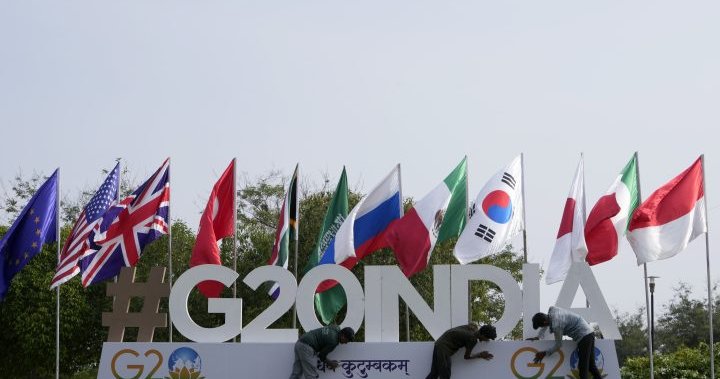When the environment ministers of the G20 nations meet in Chennai, India on Friday, they will be capping off what’s set to be the hottest month on record for Earth. Analysts say the meeting will set the tone for the COP28 summit in November this year and that Canada has the chance to lead the way.
The G20 nations comprise some of the world’s biggest polluters, including Canada, the United States, China and India. Together, this group accounts for 78 per cent of global greenhouse gas emissions. The meeting comes just days after Canada became the first G20 country to roll out a plan to phase out “inefficient” fossil fuel subsidies.
“This meeting is happening during unprecedented climate events across the world. We really need progress on climate action. The G20 ministers need to meet this moment,” said Pratishtha Singh, senior policy analyst at Climate Action Network Canada.
According to Indian media reports, the environment ministers are likely to discuss climate mitigation, adaptation and climate finance. Hindustan Times, a leading Indian daily, also reported that the G20 communique was likely to outline the G20’s expectations for the upcoming COP28 summit in Dubai.
Environment Minister Steven Guilbeault reached India on Tuesday to attend the summit.
“Minister Guilbeault is in India to strengthen global cooperation on climate, biodiversity, and pollution alongside Indian and international partners. Together, we’re committed to building a healthier planet for all,” Environment Canada said in a statement.
A day before he left for India, Guilbeault released a framework to review and phase out inefficient fossil fuel subsidies. Canada is the first G20 country to roll out such a plan.
Under the framework, unless a fossil fuel company significantly reduces greenhouse gas emissions, supports Indigenous participation, offers essential energy services to remote communities, provides short-term support for an emergency or supports projects that include carbon capture, their subsidies would be deemed “inefficient” and phased out.
Singh believes the timing of Canada’s announcement will pressure some of the bigger polluters to also consider phasing out fossil fuel subsidies.
“Canada is showing an example to the other G20 countries. This language around fossil fuel phase-down will come up in the coming moments,” she said.
She said while Canada’s plan is not without flaws, Ottawa must try to convince the rest of the G20 to adopt a similar framework. The global conversation, she said, is moving toward phasing out financing for fossil fuels.
The environment ministers’ meeting, however, comes against the backdrop of an energy ministers’ meeting last week, which ended in disappointment. The G20 underlined the need to have a just and sustainable energy transition, but failed to agree to a framework to phase down fossil fuels. Last week’s stumbling block does not bode well for climate negotiations going forward.
On Thursday morning, UN climate change executive secretary Simon Stiell and COP28 president-designate Sultan Al Jaber issued a joint statement on the outcomes of the energy meeting.
“While the discussions at the G20 Energy Ministerial considered energy transition and aligning current pathways with the Paris Goals, the outcome did not provide a sufficiently clear signal for transforming global energy systems, scaling up renewable and clean energy sources and responsibly phasing down fossil fuels,” they said in their statement.
The joint statement said the G20 had the responsibility to lead the way in terms of climate action.
“The G20 is responsible for 85% of the world’s GDP, but also 80% of the world’s emissions. Leadership by the G20 is indispensable to enable an inclusive and ambitious development agenda that demonstrates to the world that the transformation towards a net-zero and climate resilient world comes with great benefits for growth, poverty eradication and sustainable development,” they said.

The G20 ministerial comes at a time when Canada is facing a record-breaking wildfire season and heavy flooding events. Europe and North America have also recorded heat waves this month.
Researchers say the deadly hot spells in the American southwest and southern Europe could not have happened without the continuing buildup of warming gases in the air.
These unusually strong heat waves are becoming more common, a recent study has found. The same research found the increase in heat-trapping gases, largely from the burning of coal, oil and natural gas, has made another heat wave — this time in China — 50 times more likely with the potential to occur every five years or so.
A stagnant atmosphere, warmed by carbon dioxide and other gases, also made the European heat wave 2.5 C hotter, the one in the United States and Mexico 2 C warmer and the one in China 1 C toastier, the study found.
Experts argue that Canada’s plan to phase out fossil fuel subsidies, while a welcome measure, does not go far enough and has loopholes. In particular, they say the plan does not apply to loans, guarantees and equity given to the TransMountain and Coastal GasLink pipelines.
TransMountain was bought by the federal government in 2018 with plans to sell down the road.
The Coastal GasLink pipeline is owned by TC Energy, the Alberta Investment Management Corp. and KKR & Co. Inc., with 20 First Nations holding options agreements for a 10 per cent equity stake.
© 2023 Global News, a division of Corus Entertainment Inc.




